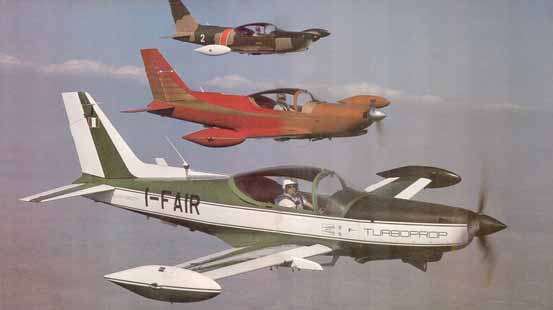PAGE SIX
MARKETING MARCHETTIS
Mike Moore sells airplanes . . . door-to-door.
Perhaps country to country would be a better description. As demonstration
pilot and sales representative for Siai-Marchetti in the Western Hemisphere,
Mike's job is to go knocking on government doors with an airplane under
each arm . . . a turboprop SF.260 and a reciprocating 260M. He calls
on countries big and small, with an emphasis on small—trying
to interest them in the SF.260 as a trainer or COIN machine and he
has a lot of stories to tell.
Moore was a twenty-year USAF Major flying F-100s in Europe. when he
drew an assignment which attached him to Siai-Marchetti who was doing
modifications on F-100 wings under contract with the Air
Force. He grew to know and like the country and the company and,
when he retired, he had a job waiting for him as a traveling salesman.
Today, Mike finds himself bouncing around the boondocks and capitals
of the world, mostly of the third world. He's crossed the Atlantic
ferrying SF.260s at least three times and in the past ten or eleven
months has made the run back and forth to South America ten times.
All of this in single-engine airplanes with nothing but fuel tanks
for company.
His suitcase is small and mostly packed with flying stories that come
from demonstrating a military airplane to governments that don't have
a real firm handle on what it means to have an air force. Some is fun,
some of it definitely isn't.
He tells the story about demonstrating the SF.260's ability to deliver
live ordnance in an unnamed South American country. They loaded his
rocket pods up with 2.75 HVAR rockets and he thought they looked a
little shop-worn . . . a fact confirmed by the 1945 date stenciled
on their sides. Coming down range he centered the target in the sight
and torched off number one.
"The rocket flamed out prematurely and started falling a couple
thousand feet short of the target area, heading for where the general
and his party were parked." The general had scrambled out of a
Jeep and was hiding under it when the rocket impacted and blew a ".
. . significant amount of dirt all over him."
With the general and his crew moved safely out of the line of fire.
Moore came around for a second pass. Triggering number two, he watched
it go spiraling off to the side as one fin failed to extend.
"I saw it go spiraling off over some houses before it blew up
a bunch of trees in the jungle beyond," he laughs. something he
does a lot. "At that point, we decided it wasn't a good idea to
fire any more of those things."
Another time, another country, the same load of ordnance . . . HVAR
rockets. He rolled out on the runway and reached up to turn the boost
pumps on in preparation for takeoff. "Talk about being surprised!",
he grins. "Static electricity somewhere in the airframe launched
three rockets and I watched them go skipping across the airport until
they finally exploded."
Explosives aren't the only problems, he says.
"I once had an instructor pilot get over-excited and try to do
a split-S from 1,000 feet and 130 knots. That's the kind of thing that
either kills you or gives you a lot of gray hair."
Moore is quick to point out that some smaller countries
have really topnotch air forces and singles out Argentina, Peru, Chile
and a few others. From the tone of his voice, it can be gathered that
he'd rather not have to tangle with some of their pilots in a live
ammo shooting match. At the same time, however, he's loaded with stories
that point out how "relaxed" some third world air force pilots
are in their attitude towards military flying.
"I was checking out some instructors in formation flying and had
four of them in a tight trail formation. I pulled into a tightening
4 G turn and just kept pulling. When I rolled out, I looked around
and found I was all by myself. Somewhere in the turn, they decided
this was no fun and went home." Again he laughs and launches into
another story; this one about about having to get the base commanding
officer to roust out his pilots to go fly since they seemed to think
the entire thing was too much work.
On one demonstration trip Moore was showing the short field capabilities
of the Siai-Marchetti turboprop version of the trusty old L-19, the
SM.1019. They were out in the jungle using a clearing hacked into the
trees and he noticed the entire strip was ringed with armed personnel
who obviously weren't on parade. Later, he asked one of the generals
what was going on and was told, "We've had a lot of guerilla attacks
on aircraft using that strip and we were just trying to make sure the
aircraft didn't get hurt."
Maybe selling door-to-door isn't what it's made out to be.
Moore spends his life in little airplanes and strange hotel rooms where
room service doesn't speak English. He can speak bits and pieces of
a dozen languages and knows how to order beer in a dozen more. He's
been a close observer to the unique political and military life styles
that characterize some very unstable parts of the world, and has had
to postpone demonstrations for several days while the military went
about correcting the outcome of elections in a forcible manner. Will
Mike Moore ever be rich and famous? Probably not, but very few men
are going to be able to retire with the truckload of memories and stories
he's amassed. Besides, he's having too much fun to worry about retiring.
For
lots more pilot reports like this one go to PILOT
REPORTS
|

